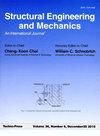节能砌块与隐形多肋框架组合墙滞回规律分析
IF 3
4区 工程技术
Q2 ENGINEERING, CIVIL
引用次数: 0
摘要
节能型砌块与隐形多肋框架组合墙是一种新型承重墙。本文主要研究了其在水平循环荷载作用下的滞回规律。首先,基于12个试件在水平循环荷载作用下的试验数据,分析了轴压比和剪跨比两个重要参数对恢复力模型的影响。其次,通过理论分析和实验数据回归分析相结合,建立了考虑四个特征点和卸载刚度退化规律的四线性恢复力模型,推导了EBIMFCW峰值载荷的理论公式;最后,通过分析典型滞回线的滞回特性,确定了恢复力模型的滞回路径。结果表明,本文所建立的四线性恢复力模型计算曲线与试验曲线吻合较好,特别是墙体峰值荷载计算值与试验值非常接近,可为EBIMFCW的弹塑性分析提供参考。本文章由计算机程序翻译,如有差异,请以英文原文为准。
Analysis of hysteresis rule of energy-saving block and invisible multi-ribbed frame composite wall
The energy-saving block and invisible multi-ribbed frame composite wall (EBIMFCW) is a new type of load-bearing wall. The study of this paper focus on it is hysteresis rule under horizontal cyclic loading. Firstly, based on the experimental data of the twelve specimens under horizontal cyclic loading, the influence of two important parameters of axial compression ratio and shear-span ratio on the restoring force model was analyzed. Secondly, a tetra-linear restoring force model considering four feature points and the degradation law of unloading stiffness was established by combining theoretical analysis and regression analysis of experimental data, and the theoretical formula of the peak load of the EBIMFCW was derived. Finally, the hysteretic path of the restoring force model was determined by analyzing the hysteresis characteristics of the typical hysteresis loop. The results show that the curves calculated by the tetra-linear restoring force model in this paper agree well with the experimental curves, especially the calculated values of the peak load of the wall are very close to the experimental values, which can provide a reference for the elastic-plastic analysis of the EBIMFCW.
求助全文
通过发布文献求助,成功后即可免费获取论文全文。
去求助
来源期刊

Structural Engineering and Mechanics
工程技术-工程:机械
CiteScore
3.80
自引率
18.20%
发文量
0
审稿时长
11 months
期刊介绍:
The STRUCTURAL ENGINEERING AND MECHANICS, An International Journal, aims at: providing a major publication channel for structural engineering, wider distribution at more affordable subscription rates; faster reviewing and publication for manuscripts submitted; and a broad scope for wider participation.
The main subject of the Journal is structural engineering concerned with aspects of mechanics. Areas covered by the Journal include:
- Structural Mechanics
- Design of Civil, Building and Mechanical Structures
- Structural Optimization and Controls
- Structural Safety and Reliability
- New Structural Materials and Applications
- Effects of Wind, Earthquake and Wave Loadings on Structures
- Fluid-Structure and Soil-Structure Interactions
- AI Application and Expert Systems in Structural Engineering. Submission of papers from practicing engineers is particularly encouraged.
 求助内容:
求助内容: 应助结果提醒方式:
应助结果提醒方式:


